Ethical Dilemma: Analyzing the Credit Manager Case Study
VerifiedAdded on 2023/04/12
|5
|1357
|134
Case Study
AI Summary
This assignment presents a case study centered on the ethical dilemma of a credit manager who initiates legal actions against debtors without prior contact. The student analyzes this situation using three key ethical frameworks: ethical egoism, utilitarianism, and moral rights. The analysis explores the implications of the credit manager's actions through each framework, considering the potential benefits and drawbacks from different perspectives. The application of ethical egoism considers the credit manager's self-interest, while utilitarianism focuses on the overall impact on all parties involved. The moral rights framework evaluates the actions in terms of respecting the rights of the debtors. The assignment concludes with recommendations on the most ethical course of action based on a synthesis of the frameworks, providing a comprehensive ethical analysis of the case.
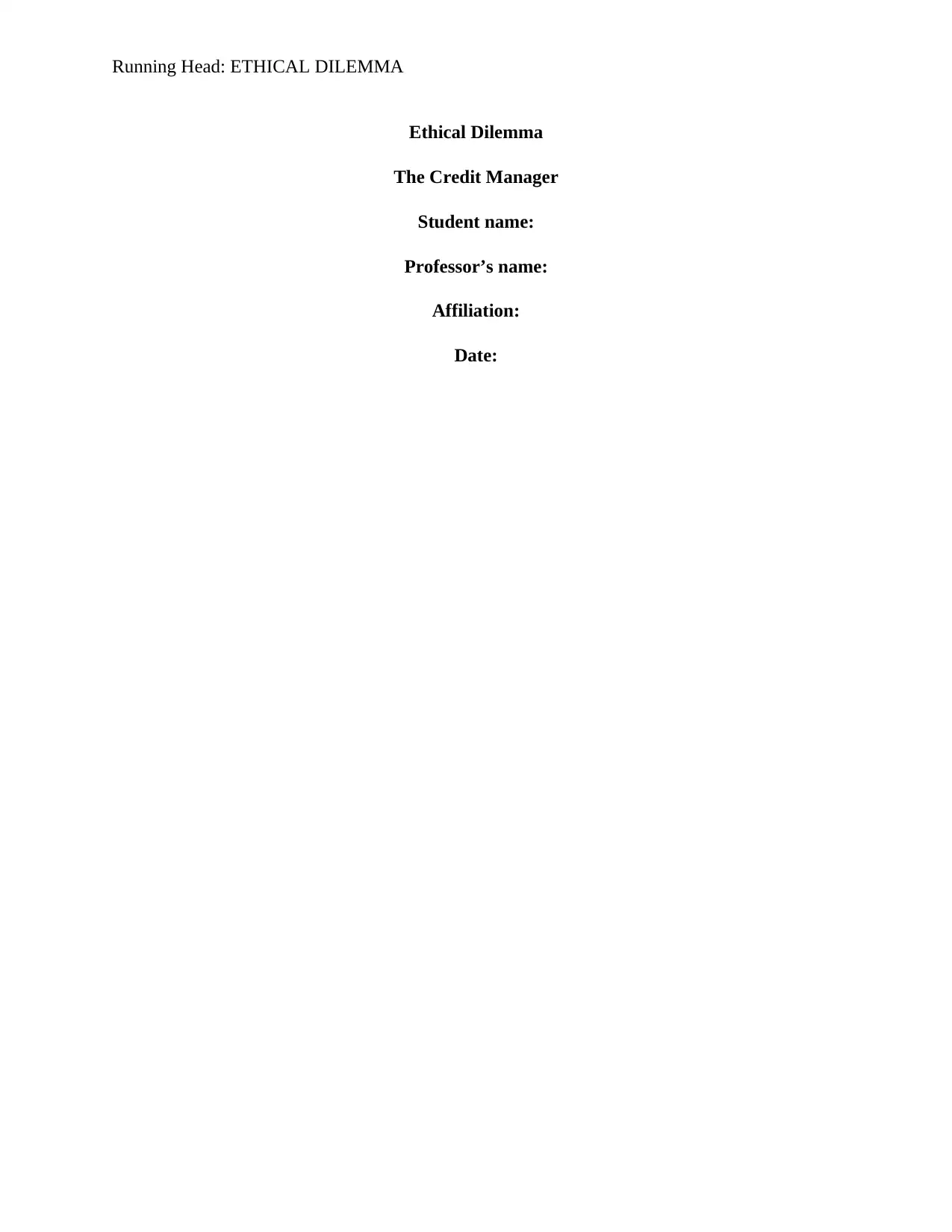
Running Head: ETHICAL DILEMMA
Ethical Dilemma
The Credit Manager
Student name:
Professor’s name:
Affiliation:
Date:
Ethical Dilemma
The Credit Manager
Student name:
Professor’s name:
Affiliation:
Date:
Paraphrase This Document
Need a fresh take? Get an instant paraphrase of this document with our AI Paraphraser
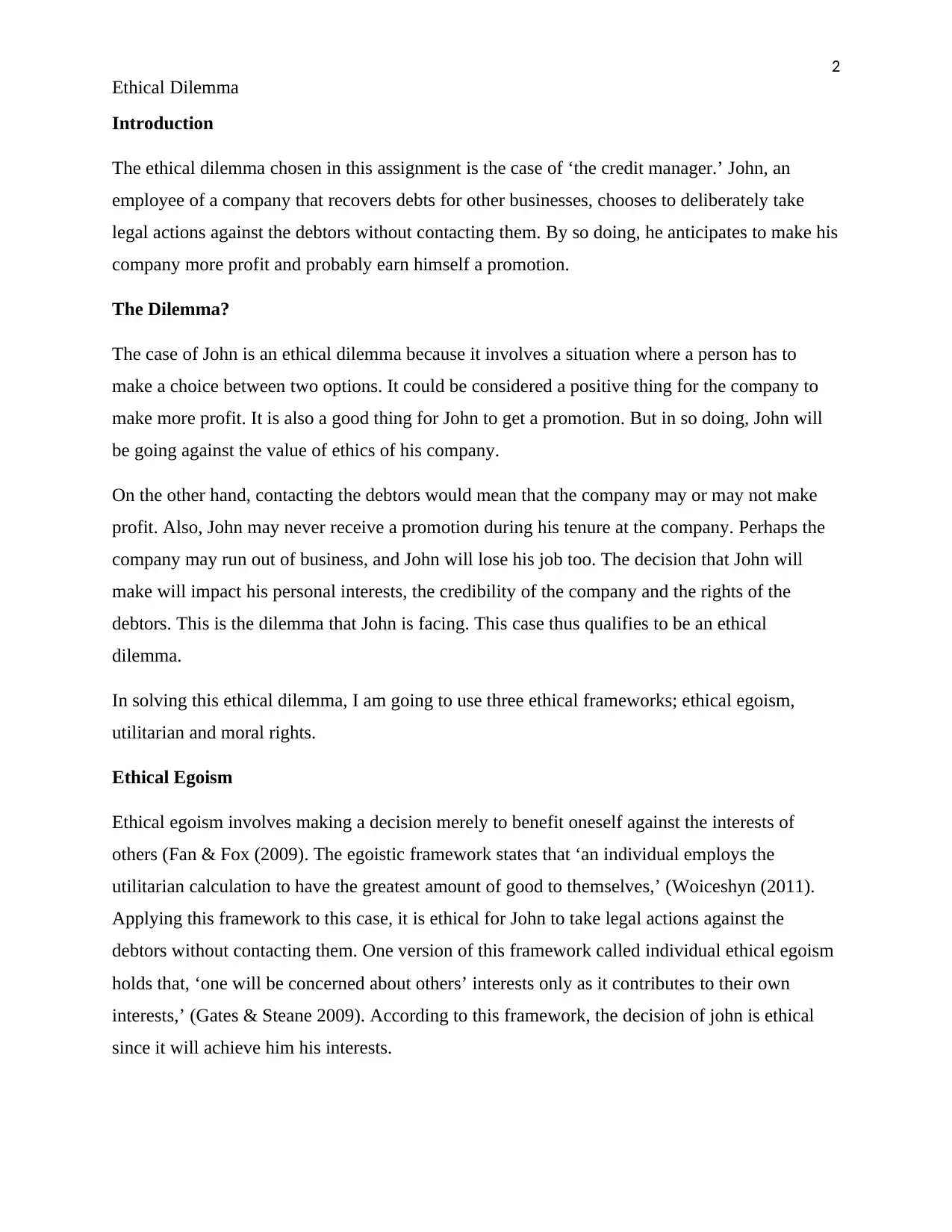
2
Ethical Dilemma
Introduction
The ethical dilemma chosen in this assignment is the case of ‘the credit manager.’ John, an
employee of a company that recovers debts for other businesses, chooses to deliberately take
legal actions against the debtors without contacting them. By so doing, he anticipates to make his
company more profit and probably earn himself a promotion.
The Dilemma?
The case of John is an ethical dilemma because it involves a situation where a person has to
make a choice between two options. It could be considered a positive thing for the company to
make more profit. It is also a good thing for John to get a promotion. But in so doing, John will
be going against the value of ethics of his company.
On the other hand, contacting the debtors would mean that the company may or may not make
profit. Also, John may never receive a promotion during his tenure at the company. Perhaps the
company may run out of business, and John will lose his job too. The decision that John will
make will impact his personal interests, the credibility of the company and the rights of the
debtors. This is the dilemma that John is facing. This case thus qualifies to be an ethical
dilemma.
In solving this ethical dilemma, I am going to use three ethical frameworks; ethical egoism,
utilitarian and moral rights.
Ethical Egoism
Ethical egoism involves making a decision merely to benefit oneself against the interests of
others (Fan & Fox (2009). The egoistic framework states that ‘an individual employs the
utilitarian calculation to have the greatest amount of good to themselves,’ (Woiceshyn (2011).
Applying this framework to this case, it is ethical for John to take legal actions against the
debtors without contacting them. One version of this framework called individual ethical egoism
holds that, ‘one will be concerned about others’ interests only as it contributes to their own
interests,’ (Gates & Steane 2009). According to this framework, the decision of john is ethical
since it will achieve him his interests.
Ethical Dilemma
Introduction
The ethical dilemma chosen in this assignment is the case of ‘the credit manager.’ John, an
employee of a company that recovers debts for other businesses, chooses to deliberately take
legal actions against the debtors without contacting them. By so doing, he anticipates to make his
company more profit and probably earn himself a promotion.
The Dilemma?
The case of John is an ethical dilemma because it involves a situation where a person has to
make a choice between two options. It could be considered a positive thing for the company to
make more profit. It is also a good thing for John to get a promotion. But in so doing, John will
be going against the value of ethics of his company.
On the other hand, contacting the debtors would mean that the company may or may not make
profit. Also, John may never receive a promotion during his tenure at the company. Perhaps the
company may run out of business, and John will lose his job too. The decision that John will
make will impact his personal interests, the credibility of the company and the rights of the
debtors. This is the dilemma that John is facing. This case thus qualifies to be an ethical
dilemma.
In solving this ethical dilemma, I am going to use three ethical frameworks; ethical egoism,
utilitarian and moral rights.
Ethical Egoism
Ethical egoism involves making a decision merely to benefit oneself against the interests of
others (Fan & Fox (2009). The egoistic framework states that ‘an individual employs the
utilitarian calculation to have the greatest amount of good to themselves,’ (Woiceshyn (2011).
Applying this framework to this case, it is ethical for John to take legal actions against the
debtors without contacting them. One version of this framework called individual ethical egoism
holds that, ‘one will be concerned about others’ interests only as it contributes to their own
interests,’ (Gates & Steane 2009). According to this framework, the decision of john is ethical
since it will achieve him his interests.
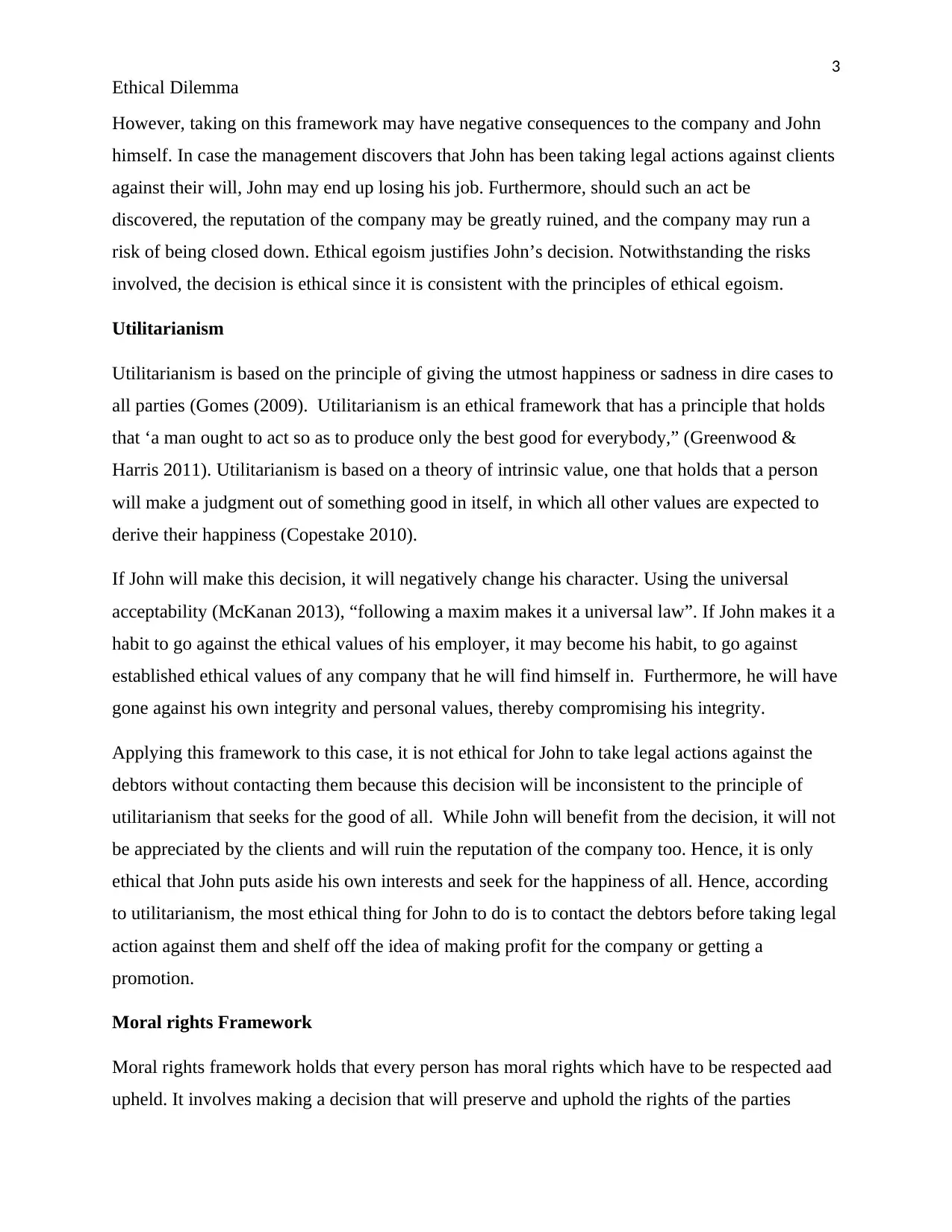
3
Ethical Dilemma
However, taking on this framework may have negative consequences to the company and John
himself. In case the management discovers that John has been taking legal actions against clients
against their will, John may end up losing his job. Furthermore, should such an act be
discovered, the reputation of the company may be greatly ruined, and the company may run a
risk of being closed down. Ethical egoism justifies John’s decision. Notwithstanding the risks
involved, the decision is ethical since it is consistent with the principles of ethical egoism.
Utilitarianism
Utilitarianism is based on the principle of giving the utmost happiness or sadness in dire cases to
all parties (Gomes (2009). Utilitarianism is an ethical framework that has a principle that holds
that ‘a man ought to act so as to produce only the best good for everybody,” (Greenwood &
Harris 2011). Utilitarianism is based on a theory of intrinsic value, one that holds that a person
will make a judgment out of something good in itself, in which all other values are expected to
derive their happiness (Copestake 2010).
If John will make this decision, it will negatively change his character. Using the universal
acceptability (McKanan 2013), “following a maxim makes it a universal law”. If John makes it a
habit to go against the ethical values of his employer, it may become his habit, to go against
established ethical values of any company that he will find himself in. Furthermore, he will have
gone against his own integrity and personal values, thereby compromising his integrity.
Applying this framework to this case, it is not ethical for John to take legal actions against the
debtors without contacting them because this decision will be inconsistent to the principle of
utilitarianism that seeks for the good of all. While John will benefit from the decision, it will not
be appreciated by the clients and will ruin the reputation of the company too. Hence, it is only
ethical that John puts aside his own interests and seek for the happiness of all. Hence, according
to utilitarianism, the most ethical thing for John to do is to contact the debtors before taking legal
action against them and shelf off the idea of making profit for the company or getting a
promotion.
Moral rights Framework
Moral rights framework holds that every person has moral rights which have to be respected aad
upheld. It involves making a decision that will preserve and uphold the rights of the parties
Ethical Dilemma
However, taking on this framework may have negative consequences to the company and John
himself. In case the management discovers that John has been taking legal actions against clients
against their will, John may end up losing his job. Furthermore, should such an act be
discovered, the reputation of the company may be greatly ruined, and the company may run a
risk of being closed down. Ethical egoism justifies John’s decision. Notwithstanding the risks
involved, the decision is ethical since it is consistent with the principles of ethical egoism.
Utilitarianism
Utilitarianism is based on the principle of giving the utmost happiness or sadness in dire cases to
all parties (Gomes (2009). Utilitarianism is an ethical framework that has a principle that holds
that ‘a man ought to act so as to produce only the best good for everybody,” (Greenwood &
Harris 2011). Utilitarianism is based on a theory of intrinsic value, one that holds that a person
will make a judgment out of something good in itself, in which all other values are expected to
derive their happiness (Copestake 2010).
If John will make this decision, it will negatively change his character. Using the universal
acceptability (McKanan 2013), “following a maxim makes it a universal law”. If John makes it a
habit to go against the ethical values of his employer, it may become his habit, to go against
established ethical values of any company that he will find himself in. Furthermore, he will have
gone against his own integrity and personal values, thereby compromising his integrity.
Applying this framework to this case, it is not ethical for John to take legal actions against the
debtors without contacting them because this decision will be inconsistent to the principle of
utilitarianism that seeks for the good of all. While John will benefit from the decision, it will not
be appreciated by the clients and will ruin the reputation of the company too. Hence, it is only
ethical that John puts aside his own interests and seek for the happiness of all. Hence, according
to utilitarianism, the most ethical thing for John to do is to contact the debtors before taking legal
action against them and shelf off the idea of making profit for the company or getting a
promotion.
Moral rights Framework
Moral rights framework holds that every person has moral rights which have to be respected aad
upheld. It involves making a decision that will preserve and uphold the rights of the parties
⊘ This is a preview!⊘
Do you want full access?
Subscribe today to unlock all pages.

Trusted by 1+ million students worldwide
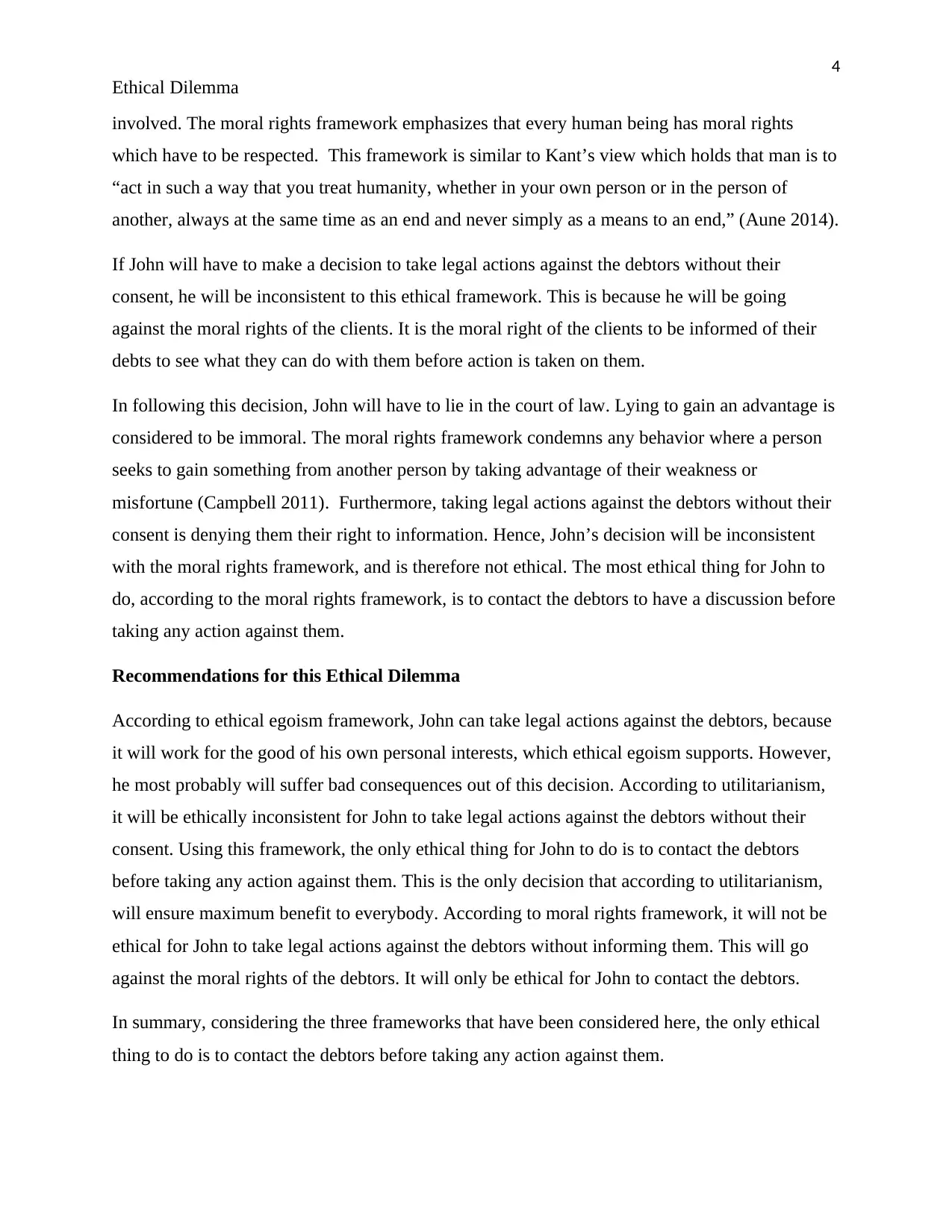
4
Ethical Dilemma
involved. The moral rights framework emphasizes that every human being has moral rights
which have to be respected. This framework is similar to Kant’s view which holds that man is to
“act in such a way that you treat humanity, whether in your own person or in the person of
another, always at the same time as an end and never simply as a means to an end,” (Aune 2014).
If John will have to make a decision to take legal actions against the debtors without their
consent, he will be inconsistent to this ethical framework. This is because he will be going
against the moral rights of the clients. It is the moral right of the clients to be informed of their
debts to see what they can do with them before action is taken on them.
In following this decision, John will have to lie in the court of law. Lying to gain an advantage is
considered to be immoral. The moral rights framework condemns any behavior where a person
seeks to gain something from another person by taking advantage of their weakness or
misfortune (Campbell 2011). Furthermore, taking legal actions against the debtors without their
consent is denying them their right to information. Hence, John’s decision will be inconsistent
with the moral rights framework, and is therefore not ethical. The most ethical thing for John to
do, according to the moral rights framework, is to contact the debtors to have a discussion before
taking any action against them.
Recommendations for this Ethical Dilemma
According to ethical egoism framework, John can take legal actions against the debtors, because
it will work for the good of his own personal interests, which ethical egoism supports. However,
he most probably will suffer bad consequences out of this decision. According to utilitarianism,
it will be ethically inconsistent for John to take legal actions against the debtors without their
consent. Using this framework, the only ethical thing for John to do is to contact the debtors
before taking any action against them. This is the only decision that according to utilitarianism,
will ensure maximum benefit to everybody. According to moral rights framework, it will not be
ethical for John to take legal actions against the debtors without informing them. This will go
against the moral rights of the debtors. It will only be ethical for John to contact the debtors.
In summary, considering the three frameworks that have been considered here, the only ethical
thing to do is to contact the debtors before taking any action against them.
Ethical Dilemma
involved. The moral rights framework emphasizes that every human being has moral rights
which have to be respected. This framework is similar to Kant’s view which holds that man is to
“act in such a way that you treat humanity, whether in your own person or in the person of
another, always at the same time as an end and never simply as a means to an end,” (Aune 2014).
If John will have to make a decision to take legal actions against the debtors without their
consent, he will be inconsistent to this ethical framework. This is because he will be going
against the moral rights of the clients. It is the moral right of the clients to be informed of their
debts to see what they can do with them before action is taken on them.
In following this decision, John will have to lie in the court of law. Lying to gain an advantage is
considered to be immoral. The moral rights framework condemns any behavior where a person
seeks to gain something from another person by taking advantage of their weakness or
misfortune (Campbell 2011). Furthermore, taking legal actions against the debtors without their
consent is denying them their right to information. Hence, John’s decision will be inconsistent
with the moral rights framework, and is therefore not ethical. The most ethical thing for John to
do, according to the moral rights framework, is to contact the debtors to have a discussion before
taking any action against them.
Recommendations for this Ethical Dilemma
According to ethical egoism framework, John can take legal actions against the debtors, because
it will work for the good of his own personal interests, which ethical egoism supports. However,
he most probably will suffer bad consequences out of this decision. According to utilitarianism,
it will be ethically inconsistent for John to take legal actions against the debtors without their
consent. Using this framework, the only ethical thing for John to do is to contact the debtors
before taking any action against them. This is the only decision that according to utilitarianism,
will ensure maximum benefit to everybody. According to moral rights framework, it will not be
ethical for John to take legal actions against the debtors without informing them. This will go
against the moral rights of the debtors. It will only be ethical for John to contact the debtors.
In summary, considering the three frameworks that have been considered here, the only ethical
thing to do is to contact the debtors before taking any action against them.
Paraphrase This Document
Need a fresh take? Get an instant paraphrase of this document with our AI Paraphraser
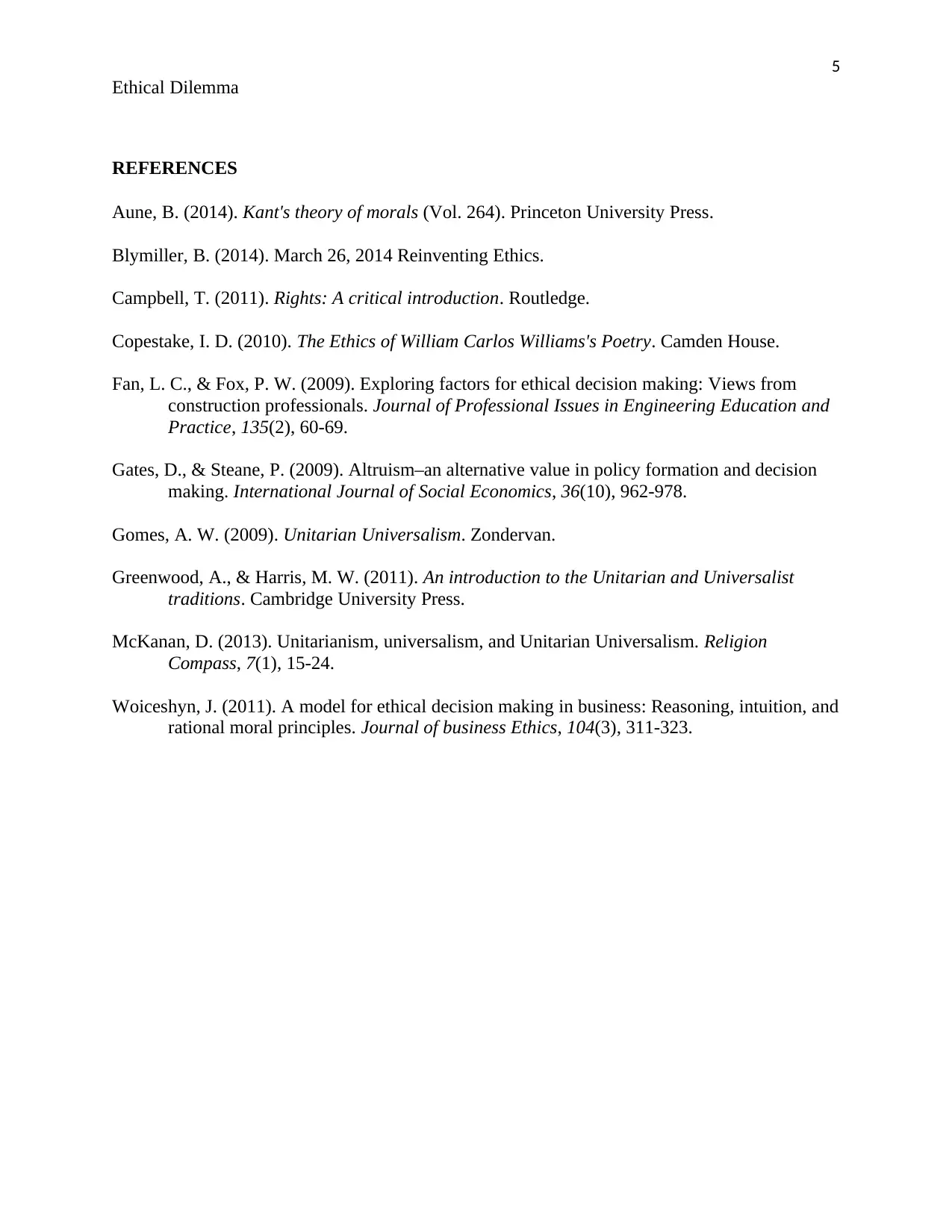
5
Ethical Dilemma
REFERENCES
Aune, B. (2014). Kant's theory of morals (Vol. 264). Princeton University Press.
Blymiller, B. (2014). March 26, 2014 Reinventing Ethics.
Campbell, T. (2011). Rights: A critical introduction. Routledge.
Copestake, I. D. (2010). The Ethics of William Carlos Williams's Poetry. Camden House.
Fan, L. C., & Fox, P. W. (2009). Exploring factors for ethical decision making: Views from
construction professionals. Journal of Professional Issues in Engineering Education and
Practice, 135(2), 60-69.
Gates, D., & Steane, P. (2009). Altruism–an alternative value in policy formation and decision
making. International Journal of Social Economics, 36(10), 962-978.
Gomes, A. W. (2009). Unitarian Universalism. Zondervan.
Greenwood, A., & Harris, M. W. (2011). An introduction to the Unitarian and Universalist
traditions. Cambridge University Press.
McKanan, D. (2013). Unitarianism, universalism, and Unitarian Universalism. Religion
Compass, 7(1), 15-24.
Woiceshyn, J. (2011). A model for ethical decision making in business: Reasoning, intuition, and
rational moral principles. Journal of business Ethics, 104(3), 311-323.
Ethical Dilemma
REFERENCES
Aune, B. (2014). Kant's theory of morals (Vol. 264). Princeton University Press.
Blymiller, B. (2014). March 26, 2014 Reinventing Ethics.
Campbell, T. (2011). Rights: A critical introduction. Routledge.
Copestake, I. D. (2010). The Ethics of William Carlos Williams's Poetry. Camden House.
Fan, L. C., & Fox, P. W. (2009). Exploring factors for ethical decision making: Views from
construction professionals. Journal of Professional Issues in Engineering Education and
Practice, 135(2), 60-69.
Gates, D., & Steane, P. (2009). Altruism–an alternative value in policy formation and decision
making. International Journal of Social Economics, 36(10), 962-978.
Gomes, A. W. (2009). Unitarian Universalism. Zondervan.
Greenwood, A., & Harris, M. W. (2011). An introduction to the Unitarian and Universalist
traditions. Cambridge University Press.
McKanan, D. (2013). Unitarianism, universalism, and Unitarian Universalism. Religion
Compass, 7(1), 15-24.
Woiceshyn, J. (2011). A model for ethical decision making in business: Reasoning, intuition, and
rational moral principles. Journal of business Ethics, 104(3), 311-323.
1 out of 5
Related Documents
Your All-in-One AI-Powered Toolkit for Academic Success.
+13062052269
info@desklib.com
Available 24*7 on WhatsApp / Email
![[object Object]](/_next/static/media/star-bottom.7253800d.svg)
Unlock your academic potential
Copyright © 2020–2026 A2Z Services. All Rights Reserved. Developed and managed by ZUCOL.





